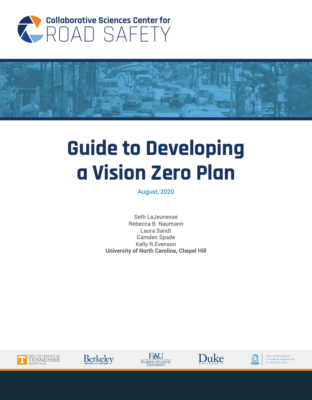UNC road safety research explores strengthening Vision Zero plans to support injury reductions and health improvements
December 16, 2020
Vision Zero is a community initiative that strives to eliminate all traffic deaths and severe injuries while increasing safe, healthy and equitable mobility for all. First implemented in Sweden in the 1990s, Vision Zero has demonstrated success in Europe and is gaining momentum across North America. Now local leaders have a comprehensive guide for enacting Vision Zero plans in their own communities thanks to a research project from UNC-Chapel Hill and the Collaborative Sciences Center for Road Safety (CSCRS).
Titled “Strengthening Existing and Facilitating New Vision Zero Plans,” the project created an inventory of existing Vision Zero plans across the country, identified features of high-quality Vision Zero plans and developed guidance to assist future plan-makers in developing and implementing sound plans with the ultimate goal of reducing the U.S. traffic fatality rate. This research led to the creation of the Vision Zero Plan Library and Guide on Vision Zero plan development.

Dr. Kelly Evenson

Seth LaJeunesse
Kelly Evenson, PhD, professor of epidemiology at the UNC Gillings School of Global Public Health and research fellow at the UNC Center for Health Promotion and Disease Prevention, is the principal investigator on the project. She was joined by Seth LaJeunesse, senior research associate at the UNC Highway Safety Research Center, as well as Professor Steve Marshall, PhD, and Assistant Professor Becky Naumann, PhD, from the UNC Injury Prevention and Research Center and Department of Epidemiology at the Gillings School. Several students from the Gillings School also participated in the project.

Dr. Becky Naumann

Dr. Steve Marshall
“My hope is that both the library and guide will be used by communities that are developing or updating their Vision Zero plan,” said Evenson. “Our ultimate goal is to support communities in reaching their vision to reduce traffic-related deaths and severe injuries to zero.”
Several cities in the U.S. have a Vision Zero strategy, including the cities of Durham and Charlotte, among others in North Carolina.
Building from their research, the team is investigating Vision Zero planning efforts across the country, including understanding the COVID-19 impacts on Vision Zero initiatives. Locally, the team supports communities across the state to grow their Vision Zero work through community-based coalitions.
CSCRS recently presented two webinars on research from the project:
Oct. 20: UNC Research Week presentation
Dec. 8: CSCRS Vision Zero webinar
More information on the project can be found on the CSCRS website.
Contact the UNC Gillings School of Global Public Health communications team at sphcomm@unc.edu.

